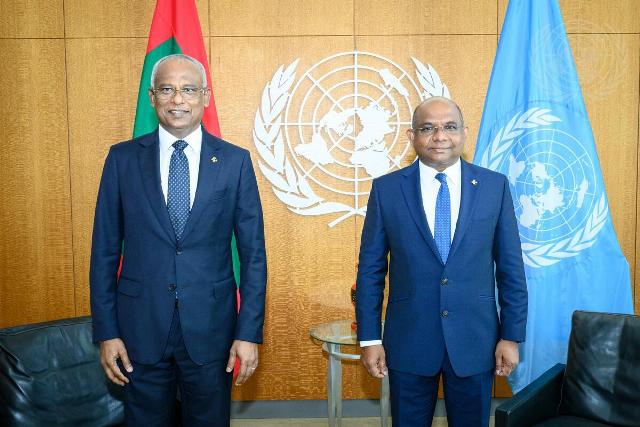 President of the UN General Assembly, former Maldives Foreign Affairs Minister, Abdulla Shahid (right) meets President of the Maldives Ibrahim Mohamed Solih. [photo: UN photo/ Loey Felipe]
President of the UN General Assembly, former Maldives Foreign Affairs Minister, Abdulla Shahid (right) meets President of the Maldives Ibrahim Mohamed Solih. [photo: UN photo/ Loey Felipe]
[This is an excerpt from an article in The Round Table: The Commonwealth Journal of International Affairs. Opinions do not reflect the position of the Round Table Editorial Board.]
Recent developments in South Asia are puzzling when it comes to the state of small states. On the one hand, Afghanistan is in huge turmoil; on the other, the Maldives, a micro state, is elected to the presidency of 76th UN General Assembly. How can one make sense of the contrasting picture of the region that predominantly comprises Commonwealth countries? Social Darwinists like Treitschke predicted that small states would disappear en masse. But that did not happen. They continue to adopt strategies for their survival and remain relevant to both regional and global politics. South Asia is a case in point.
Since the Second World War, despite differing opinions, the principle of ‘sovereign equality’ was incorporated in the UN Charter and all independent sovereign states, irrespective of their size, were accorded full membership. This decision did not create any adverse effects as small states, which make up the majority of UN members, went on to serve the UN Charter creditably with enthusiastic participation.
Crucially, small states took a keen interest in the formation and functioning of various regional organisations. Their ideas and proposals can be easily projected as those of their groups. Regional organisations also aid in the promotion of bilateral and multilateral relations among the members of the subsystem. They, in fact, are good confidence-building mechanisms in their respective regions. Thus, one could find a correlation between the increasing number of regional organisations and the proliferation of small states. Strategically, regional organisations are probably the best insurance the small states can have against any threats faced from other states, within and outside the region.
Economically, small states seek integration to achieve their economic interests. Gunnar Myrdal, in his theory of ‘Circular Causation’, talks of ‘spread’ and ‘backwash’ effects of integration. Small states do not hesitate to use regional organisations to counterbalance larger states to overcome the impact of such effects by pushing for regional free trade areas or economic unions.
Geo-strategically, small states become valuable depending on their location. Countries like Sri Lanka, Pakistan, Myanmar, Poland, Yemen, Egypt, Turkey, Panama, Cuba, Iceland, Singapore and Philippines are known for their prime location. During the Cold War, each of the two Super Powers competed to get a foothold in small states located in the other’s sphere of influence. Cuba and Pakistan gained prominence due to their location at the underbelly respectively of the United States and the former Soviet Union.
It is, therefore, difficult to ignore the significance of small states in both regional and global contexts.
As Keohane rightly observes: ‘if Lilliputians can tie up Gulliver, or make him do their fighting for them, they must be studied as carefully as the giant’. South Asia offers itself as a unique case in this regard. There is no common external security threat that is confronted by the region as a whole, but each of the countries has a tale to offer. South Asian small states have adopted a plethora of strategies to secure themselves from time to time depending on the existing regional and global situations. Except Pakistan, none of the South Asian small states has considered joining any military alliance or resorted to nuclearisation. Some were smart enough to adopt ‘bandwagoning’ with India in the beginning but later pursued an external balancing strategy in a subtle manner. Some states adopted ‘internal balancing’ to strengthen their military capacity with the help of other regional powers. While all South Asian small states did adopt a ‘hedging’ strategy, none of them thought of ‘going it alone’.
N. Manoharan is an Associate Professor, Department of International Studies, Christ University, Bangalore, India.



